It is mandatory for every Muslim to learn the words and translation of Adhan and Iqamah, it would be a matter of great regret if we do not understand the meaning of the Adhan which we listen to five times a day.

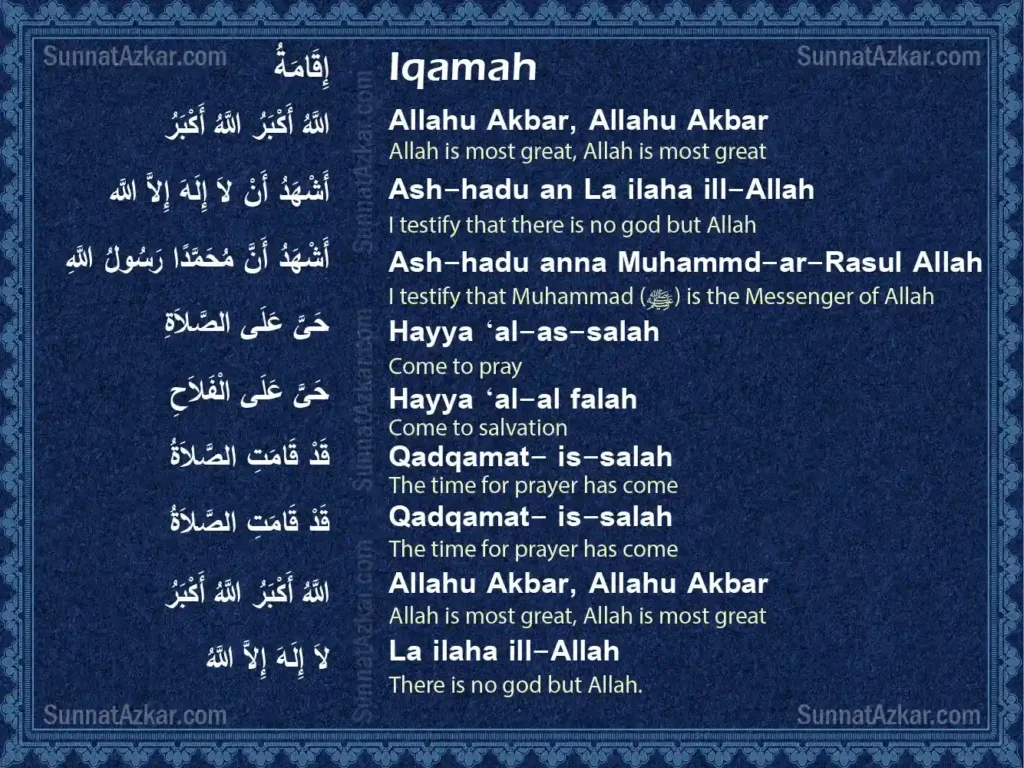
Table of Contents
Adhan and iqamah in Arabic text
Adhan:
اللَّهُ أَكْبَرُ اللَّهُ أَكْبَرُ اللَّهُ أَكْبَرُ اللَّهُ أَكْبَرُ
أَشْهَدُ أَنْ لاَ إِلَهَ إِلاَّ اللَّهُ أَشْهَدُ أَنْ لاَ إِلَهَ إِلاَّ اللَّهُ
أَشْهَدُ أَنَّ مُحَمَّدًا رَسُولُ اللَّهِ أَشْهَدُ أَنَّ مُحَمَّدًا رَسُولُ اللَّهِ
حَىَّ عَلَى الصَّلاَةِ حَىَّ عَلَى الصَّلاَةِ
حَىَّ عَلَى الْفَلاَحِ حَىَّ عَلَى الْفَلاَحِ
اللَّهُ أَكْبَرُ اللَّهُ أَكْبَرُ لاَ إِلَهَ إِلاَّ اللَّهُ
Iqamah:
اللَّهُ أَكْبَرُ اللَّهُ أَكْبَرُ
أَشْهَدُ أَنْ لاَ إِلَهَ إِلاَّ اللَّهُ
أَشْهَدُ أَنَّ مُحَمَّدًا رَسُولُ اللَّهِ
حَىَّ عَلَى الصَّلاَةِ
حَىَّ عَلَى الْفَلاَحِ
قَدْ قَامَتِ الصَّلاَةُ قَدْ قَامَتِ الصَّلاَةُ
اللَّهُ أَكْبَرُ اللَّهُ أَكْبَرُ لاَ إِلَهَ إِلاَّ اللَّهُ
Adhan And Iqamah in English Transliteration
Adhan Transliteration:
Allahu Akbar, Allahu Akbar. Allahu Akbar, Allahu Akbar.
Ash-hadu an La ilaha ill-Allah, Ash-hadu an La ilaha ill-Allah.
Ash-hadu anna Muhammd-ar-Rasul Allah, Ash-hadu anna Muhammd-ar-Rasul Allah.
Hayya ‘al-as-salah, Hayya ‘al-as-salah.
Hayya ‘al-al falah, Hayya ‘al-al falah.
Allahu Akbar, Allahu Akbar. La ilaha ill-Allah.
Iqamah Transliteration:
Allahu Akbar, Allahu Akbar,
Ash-hadu an La ilaha ill-Allah,
Ash-hadu anna Muhammd-ar-Rasul Allah,
Hayya ‘al-as-salah,
Hayya ‘al-al falah,
Qadqamat- is-salah, Qadqamat- is-salah,
Allahu Akbar, Allahu Akbar. La ilaha ill-Allah.
Adhan and iqamah Translation
Translation of the words of Adhan and Iqamah is given below in English.
Allahu Akbar = Allah is most great
Ash-hadu an La ilaha ill-Allah = I testify that there is no god but Allah
Ash-hadu anna Muhammad-ar-Rasul Allah = I testify that Muhammad (ﷺ) is the Messenger of Allah
Hayya ‘al-as-salah = Come to pray
Hayya ‘al-al falah = Come to salvation
Qadqamat- is-salah = The time for prayer has come
as-salatu khairun min an-nawm = Prayer is better than sleep
Allahu Akbar = Allah is most great
La ilaha ill-Allah = There is no god but Allah.
The Idea of Adhan, the Call for Prayer
When the Prophet of Allah, Muhammad (ﷺ) completed his exodus from Mecca to Madina, prayer became obligatory for the Muslims. But the method of giving call to gather people for prayer had not yet been introduced.
And the Muslims would gather anticipating the time to offer the prayer. At that time, people consulted with each other. Some advised to ring a bell, some said blow a bugle and some even said to light a fire on the mountain. Read the Hadees below.
Narrated Ibn `Umar:
When the Muslims arrived at Medina, they used to assemble for the prayer, and used to guess the time for it. During those days, the practice of Adhan for the prayers had not been introduced yet. Once they discussed this problem regarding the call for prayer. Some people suggested the use of a bell like the Christians, others proposed a trumpet like the horn used by the Jews, but `Umar was the first to suggest that a man should call (the people) for the prayer; so Allah’s Messenger (ﷺ) ordered Bilal to get up and pronounce the Adhan for prayers.
Reference : Sahih al-Bukhari 604
Hazrat Bilal (may Allah be pleased with him) was ordered to call the words of the Adhan twice and call those words only once in the Iqamah except “Qadqamat-is-Salah” which has to be called twice. Read the Hadees given below.
Narrated Anas:
The people mentioned the fire and the bell (they suggested those as signals to indicate the starting of prayers), and by that they mentioned the Jews and the Christians. Then Bilal was ordered to pronounce Adhan for the prayer by saying its wordings twice, and for the Iqama (the call for the actual standing for the prayers in rows) by saying its wordings once. (Iqama is pronounced when the people are ready for the prayer).
Reference : Sahih al-Bukhari 603
Narrated Abu Qilaba:
Anas said, “Bilal was ordered to pronounce the wording of Adhan twice and of Iqama once only.” The sub narrator Isma`il said, “I mentioned that to Aiyub and he added (to that), “Except Iqama (i.e. Qadqamat- is-salat which should be said twice).
Reference : Sahih al-Bukhari 607
Who taught the words of Adhan and iqamah?
The one who taught muslims how to pray has also taught the words of Adhan and Iqamah, means Allah Almighty himself taught the words of adhan and iqamah.
This is a very beautiful incident. Below is a Sahih Hadees in this regard, which narrates this entire incident. Once you read it, you won’t be able to stop yourself from sharing it with your friends and loved ones.
‘Abd Allah b. Zaid reported :
when the Messenger of Allah (ﷺ) ordered a bell to be made so that it might be struck to gather the people for prayer, a man carrying a bell in his hand appeared to me while I was asleep, and I said; servant of ‘abd Allah, will you sell the bell? He asked; what will you do with it? I replied; we shall use it to call the people to prayer. He said; should I not suggest you something better than that. I replied: certainly.
Then he told me to say: Allahu Akbar, Allahu Akbar. Allahu Akbar, Allahu Akbar. Ash-hadu an La ilaha ill-Allah, Ash-hadu an La ilaha ill-Allah. Ash-hadu anna Muhammd-ar-Rasul Allah, Ash-hadu anna Muhammd-ar-Rasul Allah. Hayya ‘al-as-salah, Hayya ‘al-as-salah. Hayya ‘al-al falah, Hayya ‘al-al falah. Allahu Akbar, Allahu Akbar. La ilaha ill-Allah.
He then moved backward a few steps and said: when you utter the IQAMAH, you should say: Allahu Akbar, Allahu Akbar. Ash-hadu an La ilaha ill-Allah, Ash-hadu anna Muhammd-ar-Rasul Allah. Hayya ‘al-as-salah, Hayya ‘al-al falah. Qadqamat- is-salah, Qadqamat- is-salah. Allahu Akbar, Allahu Akbar. La ilaha ill-Allah.
When the morning came, I came to the Messenger of Allah (May peace be upon him) and informed him of what I had seen in the dream. He said: it is a genuine vision, and he (Bilal) then should use it to call people to prayer, for he has a louder voice than you have.
So I got up along with Bilal and began to teach it to him and he used it in making the call to prayer. ‘Umar b. al-khattab (Allah be pleased with him) heard it while he was in his house and came out trailing his cloak and said: Messenger of Allah. By him who has sent you with the truth, I have also seen the kind of thing as has been shown to him. The Messenger of Allah (May peace be upon him) said: To Allah be the praise.
Reference : Sunan Abi Dawud 499
How many words in Adhan and iqamah?
According to the Hadith number 499 of Sunan Abi Dawood which we have seen above, the words of Adhan are 15 and the words of Iqamah are 11.
Another Sahih Hadees has been given above, in which Abu Mahdurah (ردي الله عنه) narrates that the Messenger of Allah (ﷺ) taught him 19 words of Adhan and 17 words of Iqamah. Read Hadees.
Abu Mahdhurah reported ; The Messenger of Allah (May peace be upon him) taught him nineteen phrases in ADHAN and seventeen phrases in IQAMAH.
ADHAN runs;
Allahu Akbar, Allahu Akbar, Allahu Akbar, Allahu Akbar,
Ash-hadu an La ilaha ill-Allah, Ash-hadu an La ilaha ill-Allah
Ash-hadu anna Muhammd-ar-Rasul Allah, Ash-hadu anna Muhammd-ar-Rasul Allah
Ash-hadu an La ilaha ill-Allah, Ash-hadu an La ilaha ill-Allah
Ash-hadu anna Muhammd-ar-Rasul Allah, Ash-hadu anna Muhammd-ar-Rasul Allah
Hayya ‘al-as-salah, Hayya ‘al-as-salah
Hayya ‘al-al falah, Hayya ‘al-al falah
Allahu Akbar, Allahu Akbar
La ilaha ill-Allah
IQAMAH runs:
Allahu Akbar, Allahu Akbar, Allahu Akbar, Allahu Akbar,
Ash-hadu an La ilaha ill-Allah, Ash-hadu an La ilaha ill-Allah
Ash-hadu anna Muhammd-ar-Rasul Allah, Ash-hadu anna Muhammd-ar-Rasul Allah
Hayya ‘al-as-salah, Hayya ‘al-as-salah
Hayya ‘al-al falah, Hayya ‘al-al falah
Qadqamat- is-salah, Qadqamat- is-salah
Allahu Akbar, Allahu Akbar
La ilaha ill-Allah
Reference : Sunan Abi Dawud 502
It is clear from the above Hadees that if 19 words of Adhan are recited then 17 words of Iqamah will have to be recited, and if 15 words of Adhan are recited then 11 words of Iqamah will have to be recited.
What to say while Answering the Adhan?
Hazrat ‘Umar (رضي الله عنه) is describing how one should answer the adhan and what is the benefit of answering the adhan in below hadees.
‘Umar reported God’s Messenger as saying:
When the mu’adhdhin says, “Allahu Akbar, Allahu Akbar,” and one of you makes the response, “Allahu Akbar, Allahu Akbar,”;
then says, “ Ash-hadu an La ilaha ill-Allah,” and he makes the response, “ Ash-hadu an La ilaha ill-Allah,” ;
then says, ”Ash-hadu anna Muhammd-ar-Rasul Allah,” and he makes the response, ”Ash-hadu anna Muhammd-ar-Rasul Allah,”;
then says, “Hayya ‘al-as-salah,” and he makes the response, “La Haula Wala Quwwata illa Billah”;
then says, “Hayya ‘al-al falah” and he makes the response, “La Haula Wala Quwwata illa Billah”;
then says, “Allahu Akbar, Allahu Akbar,” and he makes the response, “Allahu Akbar, Allahu Akbar,”;
then says, “La ilaha ill-Allah,” and he makes the response, “La ilaha ill-Allah”;
if he says this from his heart, he will enter paradise.
Muslim transmitted it.
Reference : Mishkat al-Masabih 658
In above hadees, Hazrat ‘Umar taught us that when mu’adhdhin says “hayya ‘ala as-salah” then we should say “La Haula wa La Quwwata illa Billah” in reply.
However, there is another Hadees in Sahih Muslim that says that we can say whatever the mu’adhdhin is saying, word by word, while answering to the adhan.
Abu Sa’id al-Khudri reported:
When you hear the call (to prayer), repeat what the Mu’adhdhin pronounces.
Reference : Sahih Muslim 383
Fajr Adhan
Hazrat Abu Mahdhurah, who is the narrator of the hadees which says Adhan consists of 19 phrases and Iqamah consists of 17 phrases, another hadees from him is written below.
In this hadees he mentioned the occasion when the Messenger of Allah (ﷺ) taught them the Fajr Adhan, in which the rest of the phrases were same, only addition is saying ‘as-salatu khairun min an-nawm” after saying “Hayya ‘ala al-falah”.
That is, this Adhan also has 19 sentences, and by counting the phrasse “As-Salatu Khairum Min An-Naum” twice, the Adhan of Fajr has exactly 21 phrases. Hadees is given below.
It was narrated that Abu Mahdhurah said:
“When the Messenger of Allah (S.A.W) left Hunain, I was the tenth of a group of ten of the people of Makkah who were trying to catch up with them. We heard them calling the Adhan for the prayer and we started to repeat the Adhan, mocking them.
The Messenger of Allah (S.A.W) said, ‘I heard among these people the Adhan of one who has a beautiful voice.’ He sent for us, and we recited the Adhan one by one, and I was the last of them. When I said the Adhan, he said: ‘Come here.’
He sat me down in front of him and rubbed my forelock and blessed me three times, then he said, ‘Go and give the Adhan at the sacred House.’ I said: ‘How, O Messenger of Allah?’
He taught me as you say the Adhan now: ‘Allahu Akbar, Allahu akbar, Allahu Akbar, Allahu Akbar; Ashhadu an la ilaha illallah, Ashhadu an la ilaha illallah; Ashhadu anna Muhammadan Rasulallah, Ashhadu anna Muhammadan Rasulallah, Ashhadu an la ilaha illallah, Ashhadu an la ilaha illallah; Ashhadu anna Muhammadan Rasulallah, Ashhadu anna Muhammadan Rasulallah; Hayya ‘alas-salah, Hayya ‘ala-salah; Hayya ‘alal-falah Hayya ‘alal-falah; as-salatu khairun min an-nawm;as-salatu khairun min an-nawm; – in the first (Adhan) for As-Subh (Fajr).
And he taught me the Iqamah saying each phrase twice: ‘Allahu Akbar, Allahu Akbar, (Allahu Akbar, Allahu Akbar), Ashhadu an la ilaha illallah, Ashhadu an la ilaha illallah; Ashhadu anna Muhammadan Rasulallah, Ashhadu anna Muhammadan Rasulallah; Hayya ‘alas-salah, Hayya ‘alas-salah; Hayya ‘alal-falah, Hayya ‘alal-falah; qad qamatis-salah, qad qamati-salah, Allahu Akbar, Allahu Akbar, La ilaha illallah.
Reference : Sunan an-Nasa’i 633
Sunan an nasai 634
Inserting fingers in ears while Calling Adhan
There is a hadees in Jami` at-Tirmidhi that Bilal (رضي الله عنه) used to insert fingers in his ears while calling for the prayer, calling Adhan.
And as it is narrated in Abu Dawud, when he reached at calling Haiya ‘Alas-Salah and Haiya ‘alal-Falah, he would turn his face from one side to the other, but would not allow his body to move.
Reference : Jami` at-Tirmidhi 197
Reference : Sunan Abi Dawud 520
Virtues of Adhan
The words of Adhan and Iqamah have a huge impact on Satan which he cannot tolerate. Read the hadees of Sahih Bukhari given below.
Narrated Abu Huraira:
Allah’s Messenger (ﷺ) said, “When the Adhan for the prayer is pronounced, then Satan takes to his heels passing wind so that he may not hear the Adhan and when the Mu’adh-dhin finishes, he comes back; and when the Iqama is pronounced he again takes to his heels and when it is finished, he again comes back and continues reminding the praying person of things that he used not to remember when not in prayer till he forgets how much he has prayed.”
Abu Salama bin `Abdur-Rahman said, “If anyone of you has such a thing (forgetting the number of rak`at he has prayed) he should perform two prostrations of Sahu (i.e. forgetfulness) while sitting.” Abu Salama narrates this from Abu Huraira.
Reference : Sahih al-Bukhari 1222
The Hadees of Sahih Muslim mentioned below state that the neck of the Mu’azzin will be the longest on the Day of Judgment.
And it has been described as a virtue, hence we should also learn Adhan and become the ones calling Adhan in our mosques.
Yahya narrated it on the authority of his uncle that he had been sitting in the company of Mu’awiya b. Abu Sufyan when the Mu’adhdhin called (Muslims) to prayer. Mu’awiya said:
I heard the Messenger of Allah (ﷺ) saying The Mu’adhdhins will have the longest necks on the Day of Resurrection.
Reference : Sahih Muslim 387
Sahih Muslim 852
If you want to learn how to do wudu according to sunnah then click here.
Agar ap azan aur iqamat ko Roman hindi me padhna chahte hai to yaha click kare.
Share the blessings: Share SunnatAzkar.com with your Family and Friends
We hope that we have answered all your questions regarding Adhan and Iqamah including how to call Adhan and Iqamah, the number of words in Adhan and Iqamah and the virtues of it.
You yourself should also learn Adhan, the muslim call to prayer, the recitation of which has been taught by the Holy Prophet (ﷺ) himself, and you should also encourage your family and friends to learn them so that it become a source of reward for you.
Now, you can be a part of this noble mission. Share this post with your friends, family, and acquaintances. By doing so, you’re not only helping them access authentic Islamic content but also earning unending rewards from Allah, the Most Merciful.
In a world filled with information, let’s make sure the knowledge that truly matters reaches every corner. Spread the word about SunnatAzkar.com, where faith meets authenticity.
May your sharing be a source of guidance and blessings for all, and may your efforts be rewarded abundantly by the Most High.

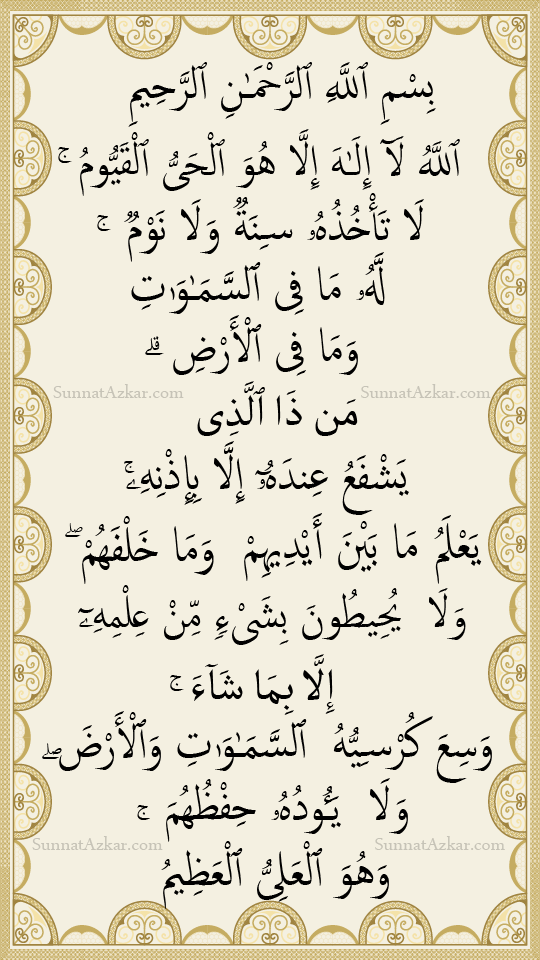

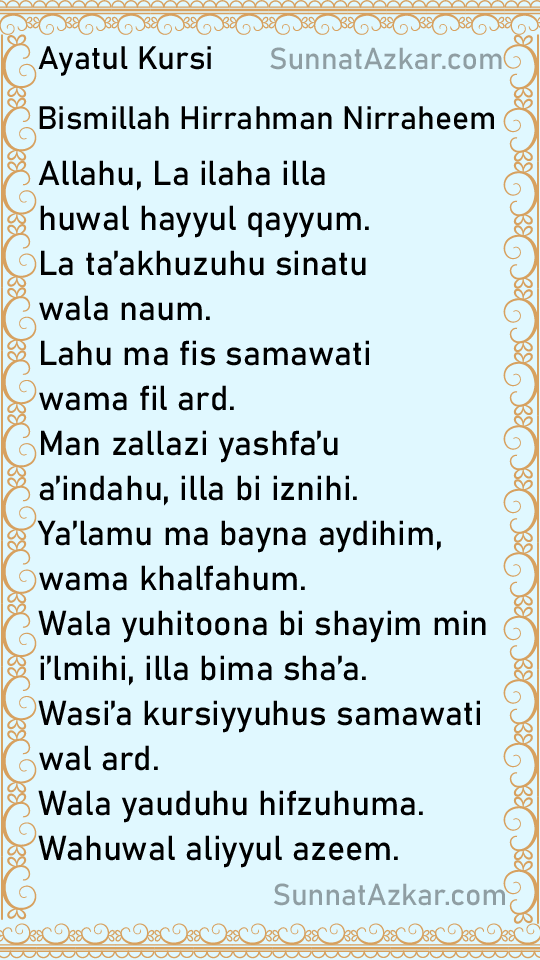
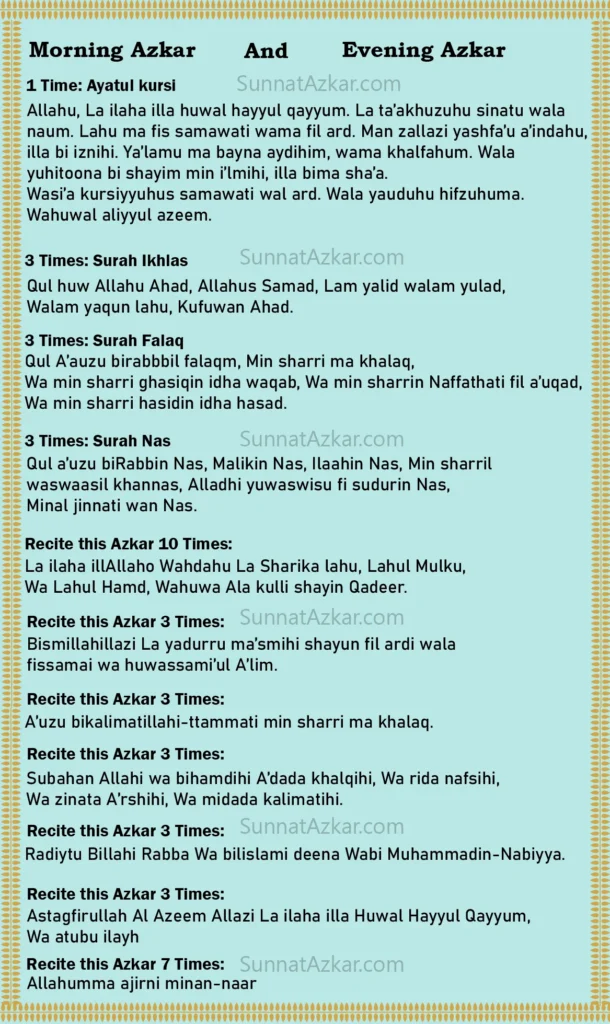
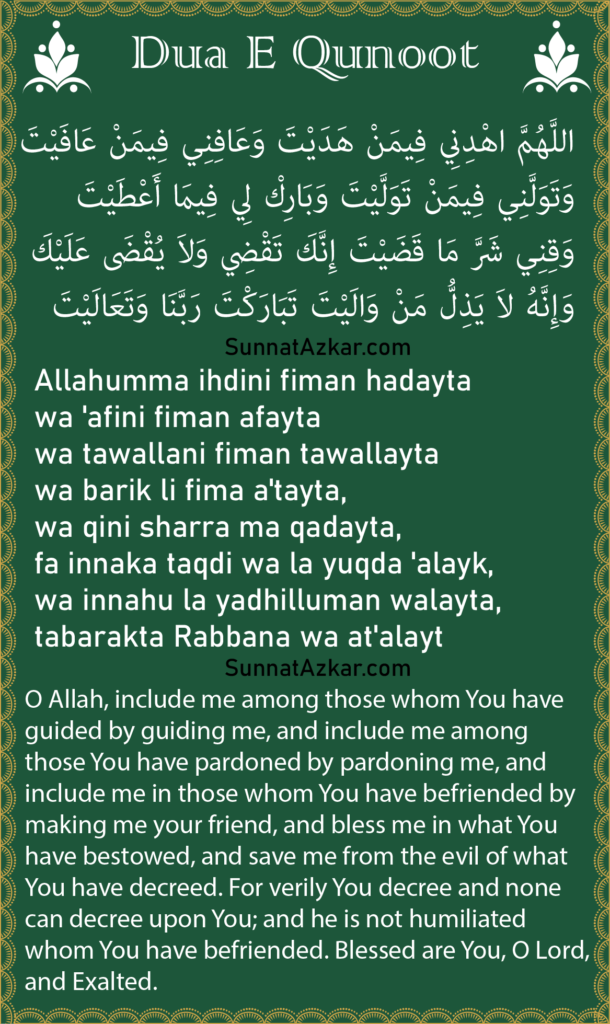







Pingback: Dua After Adhan - SunnatAzkar
Pingback: Dua Istiftah - SunnatAzkar